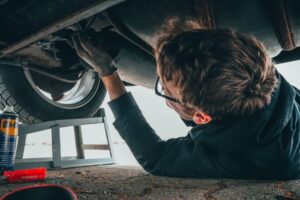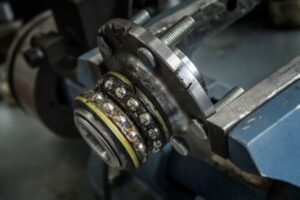Metal on metal brakes refer to a braking system where the brake pads or shoes have worn through all of their friction material, causing the metal backing of the pad or shoe to rub on the rotor or drum, which is also made of metal.
This can lead to serious problems for your rotors, drums, calipers and other parts, and can cause expensive repairs. Metal on metal brakes are not only dangerous but can also create a low-pitched grinding noise that can be heard when the brakes are applied.
There are several possible causes of metal on metal brakes, including the brake pads not being changed at the right time, causing the brake pad friction material to get completely worn out and leaving only a metal plate.
The brake shoe begins to grind on the rotor, which could cause severe damage.
Other causes of metal on metal brakes include a malfunctioning brake caliper, contaminated brake fluid, or worn-out brake hardware. It is important to have your brakes inspected regularly to avoid the costly repairs that can result from metal on metal brakes.
If you hear a grinding noise when you apply your brakes, it is important to have your brakes inspected immediately. Metal on metal brakes can cause serious damage to your vehicle and can be dangerous to drive.
Regular brake inspections and maintenance can help prevent metal on metal brakes and keep your vehicle running safely and smoothly.
What Does Metal on Metal Brakes Mean?
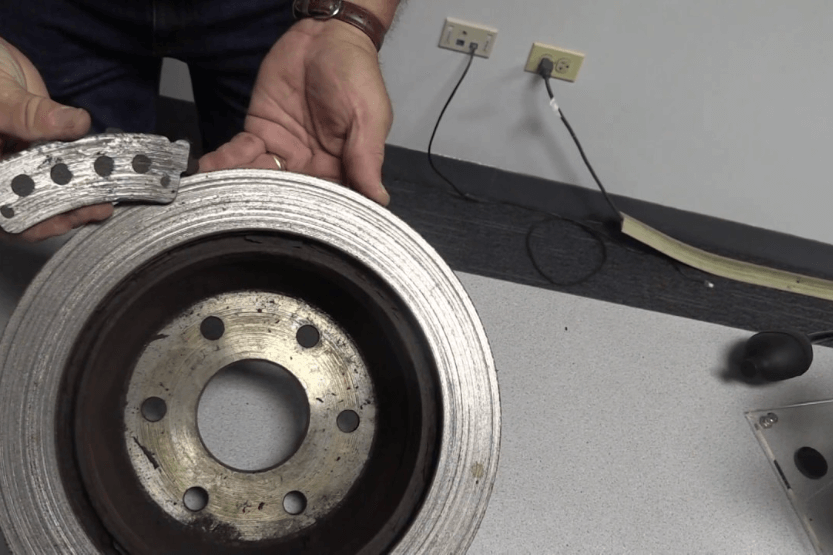
As per V&F Auto (.com), metal on metal brakes refer to the condition where brake pads or shoes have worn through all of their friction material, exposing the metal backing of the pad or shoe.
This metal-to-metal rubbing occurs when the brake pad or shoe rubs on the rotor or drum, which is also made of metal.
In other words, the brake pad or shoe is no longer providing any friction to slow down the vehicle, and the metal parts are grinding against each other.
Metal on metal brakes are a serious safety concern as they can cause a vehicle to have reduced stopping power, longer stopping distances, and even brake failure. This can lead to accidents and injuries.
Drivers should be aware of the warning signs of metal on metal brakes, such as a grinding noise or reduced braking performance, and have their brakes inspected immediately if they suspect an issue.
Metal on metal brakes can occur due to several reasons, including worn brake pads or shoes, damaged rotors or drums, or a malfunctioning brake system. Regular brake maintenance and inspections can help prevent metal on metal brakes from occurring and ensure the safety of the driver and passengers.
It is essential to understand that metal on metal brakes require an expensive repair and should not be ignored. Continuing to drive with metal on metal brakes can cause further damage to the brake system and lead to more significant safety concerns.
Therefore, it is crucial to have brakes inspected and repaired as soon as possible if metal on metal brakes are suspected.
Effects of Brakes Worn Metal on Metal
When brakes are “metal to metal,” it means that the brake pad material has worn down to the point where the metal backing plates are exposed and rubbing directly against the metal rotors. This can cause a number of negative effects on the vehicle’s braking system.
One of the most obvious effects of brakes worn metal on metal is a loud, grinding noise when the brakes are applied. This noise is caused by the metal backing plates rubbing against the metal rotors, and it can be heard both inside and outside of the vehicle.
The noise is often accompanied by a noticeable decrease in braking performance, as the worn brake pads are no longer able to grip the rotors effectively.
Worn metal on metal brakes can also cause damage to other components of the braking system. For example, the metal backing plates can scratch and score the surface of the rotors, which can lead to uneven wear and reduced braking performance over time.
Additionally, the increased friction caused by metal on metal braking can generate a great deal of heat, which can cause the brake fluid to boil and reduce the effectiveness of the entire braking system.
If left unaddressed, brakes worn metal on metal can lead to more serious and expensive problems down the line.
For example, the excessive heat generated by metal on metal braking can cause the rotors to warp or even crack, which can require costly repairs or replacement.
Similarly, the increased wear and tear on other components of the braking system can lead to premature failure and the need for expensive repairs.
It is important to have brakes inspected regularly and to address any signs of wear or damage as soon as possible to avoid the negative effects of brakes worn metal on metal.
A qualified mechanic can inspect the braking system and recommend appropriate repairs or replacements, which may include new brake pads, rotors, or even a complete brake system overhaul.
What to Do If Your Brakes Are Grinding on Metal?

If you hear a grinding noise coming from your brakes, it could be a sign that the brake pads have worn down to the metal backing. This can cause damage to your brake rotors and reduce the effectiveness of your brakes, making it important to address the issue as soon as possible.
The first step is to take your vehicle to a trusted mechanic for an inspection. They will be able to diagnose the problem and recommend the necessary repairs. In some cases, the brake pads may need to be replaced, while in others, the rotors may need to be resurfaced or replaced.
It’s important to note that metal on metal brakes can be dangerous and should not be ignored. Driving with worn brake pads can cause the brakes to fail, leading to a potentially serious accident. Therefore, if you suspect that your brakes are grinding on metal, it’s best to have them inspected right away.
In addition to having your brakes inspected and repaired, there are some preventative measures you can take to avoid metal on metal brakes in the future. One of the most important is to have your brakes checked regularly and to replace the brake pads before they wear down to the metal backing.
Another preventative measure is to avoid harsh driving conditions that can accelerate brake wear. This includes driving in stop-and-go traffic, towing heavy loads, and driving on steep hills. By taking these steps, you can help ensure that your brakes last longer and perform better.
In summary, if your brakes are grinding on metal, it’s important to take action right away. This means having your brakes inspected and repaired by a trusted mechanic, as well as taking preventative measures to avoid metal on metal brakes in the future.
With the right care and attention, you can keep your brakes in top condition and enjoy safe, reliable driving.
Is It Safe to Drive with Metal on Metal Brakes?
Driving with metal on metal brakes is not safe and should be avoided. When the brake pads wear down to the point where they are completely gone, the metal backing plates of the pads come into contact with the metal rotors or drums.
This metal-to-metal contact creates a grinding noise and can cause significant damage to the braking system and other components of the vehicle.
Metal on metal brakes can also compromise the safety of the vehicle. The braking distance increases, and the vehicle may not stop as quickly as it should, which can lead to accidents.
Additionally, the heat generated by metal on metal contact can cause the brake fluid to boil, resulting in a complete loss of brakes.
While some sources suggest that you can drive around 1500 miles with grinding brakes before causing significant damage, it’s crucial to remember that this is not a recommended practice.
Continuing to drive with metal on metal brakes can cause deeper damage to other parts of the braking system, such as the caliper pistons, which can stick when overheated.
It’s also important to note that driving with metal on metal brakes can be illegal in some states. Most states have laws that require vehicles to have properly functioning brakes, and driving with metal on metal brakes can result in a ticket or even a vehicle impoundment.
In summary, driving with metal on metal brakes is not safe and should be avoided. It can cause significant damage to the braking system, compromise the safety of the vehicle, and even be illegal in some states.
If you suspect that your brakes may be grinding or making a metal on metal noise, it’s essential to have them inspected and repaired by a qualified mechanic as soon as possible.
How to Prevent Metal on Metal Brakes

Metal on metal brakes can be prevented with proper maintenance and care. Here are some tips to help prevent metal on metal brakes:
- Regular Inspection: Regular inspection of the brake pads and shoes can help detect any signs of wear and tear. Scheduling an inspection every 12,000 miles or once a year is a good practice.
- Replace Brake Pads: Replacing brake pads before they wear out is crucial in preventing metal on metal brakes. Generally, brake pads should be replaced every 50,000 miles, but this can vary depending on the type of driving and the vehicle.
- Avoid Hard Braking: Hard braking can cause excessive heat and wear on the brake pads, leading to metal on metal brakes. Try to avoid sudden stops and apply the brakes gradually.
- Use Quality Brake Pads: Using high-quality brake pads can help prevent metal on metal brakes. Cheap brake pads may wear out faster and cause damage to the rotors.
- Replace Rotors: If the rotors are worn or damaged, they should be replaced. Driving with worn rotors can cause the brake pads to wear out faster and lead to metal on metal brakes.
- Keep Brake System Clean: Keeping the brake system clean can help prevent metal on metal brakes. Dirt and debris can cause damage to the brake pads and rotors, leading to premature wear.
So, here’s the deal: as a mechanic, I’m here to share some easy-peasy tips. If you wanna steer clear of that annoying metal-on-metal brake situation and keep your brake system running smoothly, just stick to these pointers.
Plus, remember, giving your brakes a little TLC through regular maintenance can help them last longer and keep your wallet happy by dodging those pricey repairs.
To Wrap Up
In conclusion, metal on metal brakes can be a serious issue that should not be taken lightly. It is important for drivers to be aware of the signs of metal on metal brakes, such as grinding or squealing noises when applying the brakes.
If these signs are present, it is crucial to take the vehicle to a trusted mechanic as soon as possible to avoid further damage.
Preventative maintenance can also help avoid metal on metal brakes. Regular inspections and brake pad replacements can help ensure that the brakes are functioning properly and prevent damage to other parts of the vehicle.
In the event that metal on metal brakes do occur, it is important to address the issue promptly. Continuing to drive with metal on metal brakes can cause damage to other parts of the vehicle and increase the cost of repairs.
Overall, being aware of the signs of metal on metal brakes and taking preventative measures can help drivers avoid costly repairs and keep their vehicles running smoothly.

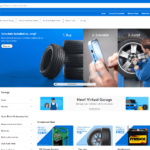
![C-clamp for Brakes [8 Best and What Size Should You Use?] c clamp for brakes](https://roadsumo.com/wp-content/uploads/2022/05/c-clamp-for-brakes-150x150.jpg)
![Gravity Bleed Brakes Alone - How To [One Person] Gravity Bleed Brakes](https://roadsumo.com/wp-content/uploads/2021/05/gravity-bleed-brakes-150x150.jpg)
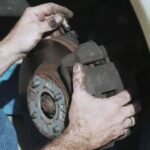
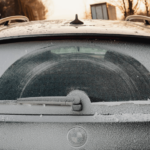
![Honda Brake Fluid [What You Need to Know] Honda Brake Fluid](https://roadsumo.com/wp-content/uploads/2022/02/Honda-brake-fluid-150x150.jpg)

